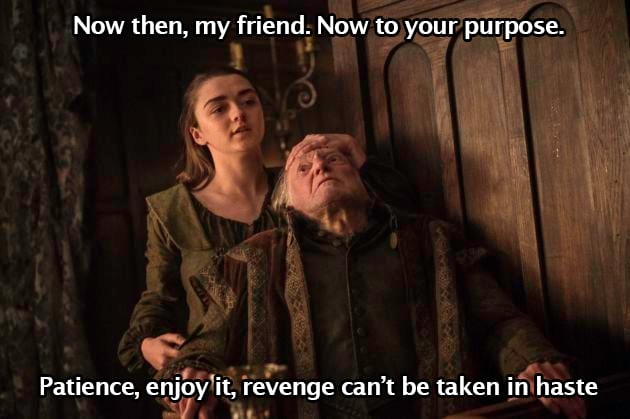Welcome to the third and final installment of “Sexism and Season 6,” the essay series seeking to counter the distressingly abundant claim that Game of Thrones (GoT) overcame the charges of sexism previously levied at it and delivered a feminist season. This particular section tackles the misguided notion that violence as a path to empowerment is in any way feminist, especially when it’s the only path offered by showrunners David Benioff and Dan Weiss, and their creative team (D&D).
Those who follow me on social media have probably heard me mention the fact that I have an “Unsullied” (non-book reader) brother who is a fan of the show. I was at his house recently and GoT came up, along with the whole concept of its “women problem” and if Season 6 had successfully “fixed” it. I told him that I hated this season and found it pandering, and he threw up his arms in exasperation and said, “so the show can’t win!”
But see, this season was pandering, and not subtly so. For all D&D claimed that “not one word” of their scripts had changed as a result of criticism, it is very obvious that just about every plotline was shoved full of characters and moments that D&D thought would appeal to their female viewers. We had women sassing men, women declaring war on weak men/men who didn’t think women should rule, women being put in positions of power, women getting revenge… Even women “burning the patriarchy to the ground.”
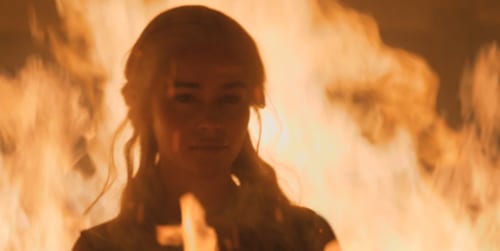
Now, I explained in Part 1 of this series how the setting against which these women triumph was so meaningless that the idea they’ve been largely punished in the first place is nearly inexcusable, while Part 2 tackled the actual scripting of the female characters and how it was full of sexist tropes and assumptions. Still, I think the truly offensive element of this season to me is that what was presented to us—what I just described in the paragraph above—is what I was “supposed” to want. It was what women were supposed to want. And clearly it worked for a bunch of people; I’d never argue otherwise.
But what I would also argue is that the “empowerment” Season 6 offered was, at least in my opinion, utterly sexist at its core. However, before that can be expanded, it’s important to clarify what “empowerment” even is.
Simply put, to “empower” someone in a sociological sense means to enable a marginalized individual to combat the discrimination they face and to be in a position to achieve greater influence, (literally “to bestow power”) or to be involved in the decision making processes from which they were previously excluded. What does it mean when we talk about an “empowered woman” in literature and scripted media? A woman who displays qualities and/or acts in a manner that is challenging to the socially discriminatory processes/systems/institutions that oppress individuals based on gender identity, and/or a woman who has obtained power within said systems.
D&D’s version of female empowerment, however, was not in any way challenging to any social system, because it was rooted in their own privileged assumptions about how the world works. It’s what two white dudes with a pattern of not listening to criticism, of not bringing in a diversity of voices to the writers’ room, and of not making any noticeable effort to understand their own privilege conceive of as feminism. Don’t get me wrong: I truly believe that the men working on GoT are trying to do right by women. Sexists aren’t just those wacky old dudes talking about how a woman’s place is in the kitchen. Sometimes they’re very educated individuals who think of themselves as progressive, yet never allow a space for their worldviews be challenged, and are insistent on being allies by talking over everyone to put forth the story they believe is the most compelling/best for everyone. Which is sort of exactly how privilege works.
This issue isn’t just restricted to sexism, by the way, especially in Season 6. Look at how the story of Loras vs. the strawman homophobes was all about the straight people acting and reacting to the events. Loras was an object; a passive victim whose suffering was meant for us to voyeuristically consume, so we could shake our righteous fists at the Faith Militant.

Or do I need to remind you of the show’s treatment of disability and mental illness this year? Hodor’s condition was presented as a “whodunit” mystery, and Theon’s PTSD was screamed away when it inconvenienced Yara. She outright told him that he should kill himself or get on with it, and the narrative confirmed that it was apparently what he needed to hear in that moment, because that’s how trauma works.
And boy was Tyrion’s plotline perhaps the most meta of them all: he spent a full season explaining slavery and how to navigate the situation to Missandei and Grey Worm. He was proven wrong for a millisecond, but that was quickly fixed the next episode to show how once again, he was the only person with the ideas and answers that Slaver’s Bay the Bay of Dragons needed.

The story is so progressive when it comes to race, as long as white people are the ones triumphing or saving the day. It’s so progressive on LGBT+ issues when it’s straight people who are fighting the homophobes. And it’s so wonderful and inclusive when it comes to depicting mental difference by showing that there’s a reason/inception point for why everyone is the way they are, and that trauma should be treated as something to “overcome” so people can return to their “old” selves! There’s no other way to put this than to say: this is a story written by the privileged, for the privileged.
So of course when it comes to writing a “pro-woman” story, D&D are just as unsuccessful. These men (including writer-producer Bryan Cogman and staff writer Dave Hill) cloistered themselves away in a room, determined to “ignore criticism” to the point where they didn’t even attend SDCC last year, and then churned out a story that they thought would appeal to women without bothering to check with a single woman. Or have a woman serve as a director. It’s like they wanted to shut the critics up by “fixing” this problem, but had no interest in what the actual dialogue about said problem was. To this day their creative team doesn’t know what the actual complaints about last season even were.
And I’m in no way saying, by the way, that men can’t be feminists, or that any woman brought onto the creative team would have automatically been one herself. But what I am saying is that when you’re in a position of power like D&D, working on a show that has a proven track record of issues when it comes to the portrayal of women, having a writing and directing team of only other men is not too flattering. In fact, it might be what I’d call “faulty allyship.”
Just as we got a story about LGBT issues heavily rooted in the straight-gaze, Season 6 gave us a “feminist” story heavily rooted in patriarchal values.

I think it’s important to tackle the argument “well women have to behave in this way to gain power because that’s the setting.” Not to be too repetitive, but Part 1 of this series covered how “the setting” holds no meaning. However, even if we can somehow pretend that D&D managed to do a very good job in this department, there’s the issue of their confusion when it comes to depicting a toxically patriarchal world versus endorsing, through their narrative, the qualities valued in such a world. In the books (just hear me out), George R.R. Martin portrays some really awful things that happen to his characters as a result of the heavily misogynistic society that they live in, and that can be really upsetting to read about. But he bends over backwards to show that the society itself is completely unstable and untenable:
“…[Martin] uses the setting of Westeros to really highlight the issues that arise from the characters navigating such a toxic patriarchy, as well as the inherent hypocrisy that comes with the worship at the altar of the “chivalrous knight” and the “maiden fair.” Chivalry, despite being all about “treating women right” and placing “virginal” women on a bizarre pedestal, is sexist. Benevolently so, yes, but still sexist.”
D&D…do no such thing. There’s no examination of the toll that embracing these awful ideals has on their characters. How can there be any exploration of the way in which every highborn woman in society is groomed and utterly lacking in sexual agency when The Reach is portrayed as the sexual liberation capital of the world where Olenna can poo-poo a betrothal to a prince, sleep with her sister’s betrothed, and the dude would find her assertions of her desires so endearing that he’d agree to screw over both of their Houses by marrying her? Sorry, I mentioned the inconsistent setting again, didn’t I? (It’s part and parcel, I promise.)
Even if this was something that Olenna was supposed to have done behind everyone’s back because of how oppressed she is, the fact doing such a thing would even occur to her betrays, if nothing else, D&D’s complete lack of care when it comes to scripting how a woman would reasonably think and act in this setting.

And truthfully, this isn’t just about how women act. The issue is that D&D seem to completely buy into the concept of “toxic masculinity.” As a quick review, this is the assumption that masculinity, viewed as the compulsory gender presentation for men, is unemotional, sexually aggressive, and violent. Men who present outside of these gender norms are emasculated, and thus not treated as “real men.” It’s not that there aren’t aggressive and violent men, or that anything is wrong with masculinity in and of itself. It’s just that this socially constructed gender expression is viewed as the only acceptable option for men, and that’s where the danger lies.
Needless to say the scripting of every male character buys into this notion. As I pointed out in an earlier piece about GoT’s sexism, D&D completely scripted away Jaime’s struggles with PTSD from the book because they thought it’d be more fun if he had a wacky fight where his golden hand stopped a sword (and apparently in their first draft they forgot entirely that losing his right hand would have been a handicap for him until George R.R. Martin pointed that out). Similarly, Tyrion’s alcoholism was made out to be a joke and his depression was magically fixed by spotting a dragon. Sam was “fixed” from the source material so that instead of devaluing his own skills despite proving his strength time and time again, he spent Season 5 walking around, bragging about getting laid and killing a Thenn. Men’s victimization at the hands of women was played for laughs, such as Tommen’s rape and Bronn’s torture. And of course, any man that did not present as traditionally “manly” in speech or actions was mocked for weakness, such as Hizdahr.

I suppose one could claim that it’s to a point, and that we’re supposed to be horrified by what the setting leads to in terms of this compulsory gender role, but…no! That’s not the show we’re watching at all. We’re meant to laugh at Tyrion’s drinking jokes, to cheer when Tormund kills the Lord of Bones because #nohomo, and to agree with Dany’s remark about that wuss Hizdahr. Men aren’t allowed to show weakness, nor are they given the space to explore (or even understand) their own victimization… Heck! Jon barely seemed to remember his own death!
Perhaps what best exemplifies Benioff and Weiss’s perspectives on their scripting of men comes from a Scriptnotes Podcast episode they were on back in February. The host asked them to match up GoT characters to American politicians, and jokingly suggested Ramsay was a good choice for Ted Cruz. Benioff disagreed, saying:
“Ramsay is actually kind of a badass. Like Ramsay fights…yeah.”
Yes, this was a joke aimed more at Ted Cruz’s proactivity than anything else, but clearly, D&D think they did something quite special with that character. That scripting scene after scene of a violent abusive asshole somehow made Ramsay “badass,” and what we should be in awe of him, or at least respect him, because “he fights.” And D&D have certainly bent over backwards to ensure that Ramsay was the perfect villain to the point where he is fits entirely the fanfiction trope of a Villain Sue: he’s a better tactician than Jon, he’s an amazing fighter to the point where he’ll be surrounded by a field of corpses, he’s a better politician than his dad given the way the Northern Lords fell over him this year. He would have won the Battle of the Bastards too if not for those meddling Vale Lords. Over and over again, the show sought to impress on us how much of a total threat Ramsay was. And apparently a badass as well.
Yes, I’m aware that Ramsay is a villain so it seems like it’s a depiction vs. endorsement kind of thing, but these are the skills that are valued and rewarded by the story at every turn. The skills that are the height of badassery, apparently, so any other character that we’re supposed to take seriously also commits acts of violence. Only difference? The good guys just use violence to gain revenge, and revenge is noble. Revenge on GoT is also inherently violent, because violence is what’s respected by the narrative, or at least taken seriously (see the “badass” quote again).
Stannis deciding to attack Winterfell was framed as his ambition, a “bad” thing, and one that he was ultimately punished for—punished so thoroughly that it bordered on ridiculous with his terrible, horrible, no good very bad day. On the other hand, Jon seeking to attack Winterfell to avenge his family was framed as noble and “good.” Jon’s revenge on the Night’s Watch mutineers was one of the primary things that earned him his Lord Commandership (at least that’s what Sam’s speech to the brothers seemed to imply). Olly stabbing Jon was bad, but Jon hanging Olly was justice.
And if it seems like I’m picking on Jon a lot…I am, because he’s more or less our Designated Protagonist™. So it’s not as if we can even try to pretend that there’s any grander commentary on the futility of revenge nor a condemnation of violent means to an end.
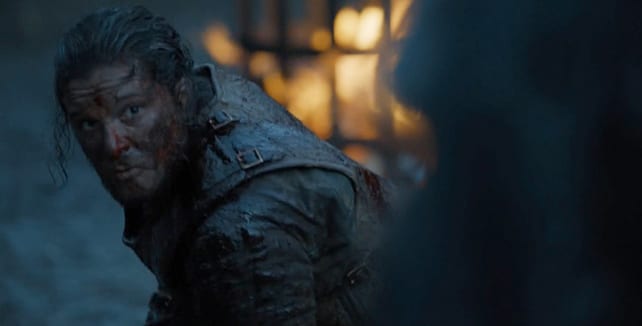
This all comes back to what “empowerment” means on GoT. Violence as empowerment is, as I’ve been saying, what’s clearly being endorsed here, and that’s a toxically masculine-coded path. Being a victim makes a man feel weak (and thus emasculated), so he regains his sense of power through violence since that’s what’s respected in a patriarchal culture. This is truly the harm of “toxic masculinity”: that Men are expected to Act from a place of physical strength, and can thereore be blamed for their own victimization if they lack the “skills” to gain power back. Real Men™ wouldn’t find themselves in such scrapes. It’s almost as if the sexism of GoT isn’t good for the male audience either.

However, this problem simply doubles down when it comes to the way that women find empowerment on GoT, because all D&D did was apply the same exact rubric to them. Women on the show get hurt/abused/killed, so they hurt/abuse/kill men in return, and this is how they end up being Women on Top™. The “feminist” message of the Season 6 was that violent women are empowered because violence is respected (and male-coded), and apparently feminism is when women demonstrate that they can be just like patriarchy-approved men. Which is an understanding feminism straight out of either the 80’s or an MRA meeting.
What’s particularly distressing is that quite a few women on GoT started out this season well on their way to being empowered without buying into this violent revenge-worship narrative. Or as I like to put it, “actually being empowered,” since such a path comes with an inherent challenge to the system in which they’re oppressed. Yes, the setting is so inconsistent across the board that challenging it is meaningless, but there was a chance for it not to be, at least in discrete storylines.
Yara is perhaps my favorite example, because for a hot minute I had a character I actually liked on the show. And I don’t mean Cersei, for whom my enjoyment of was due to a narrative D&D had no idea they were telling; I liked Yara as a character within the story we were meant to enjoy. I legitimately found her conversation with Balon, where she pointed out the futility and utter bull of the reaving lifestyle, compelling. She refused to be cowed when he tried to shame her for attempting a rescue of Theon, and it seemed like she might actually be a person who could elicit positive change in such a world.
However, the next scene we saw her in was when she swore revenge on the man who murdered her father. Which was one hell of a guess for her.
“I’m going to find out who did this. I’m going to feed them to the sharks while they live.”
Reasonable. I already detailed in Part 2 how her scripting then went from bad to worse with her abuse of Theon, her passivity at the Kingsmoot, her purchasing and rape of a sex slave, and ultimately, her alliance with Daenerys to “murder an uncle or two.” Because Real Feminists will murder any guy who isn’t a good ally!
Lady Crane is another great example. The sheer ridiculousness of her randomly asking for acting advice from Arya just because she had “nice eyebrows” did distract a bit, but in general it was hard not to be a little won over by the way Lady Crane handled herself, how she dealt with sexism in the workplace, and her total compassion and willingness to help an injured Arya, despite not knowing her all that well and clearly understanding all the red flags following her around.
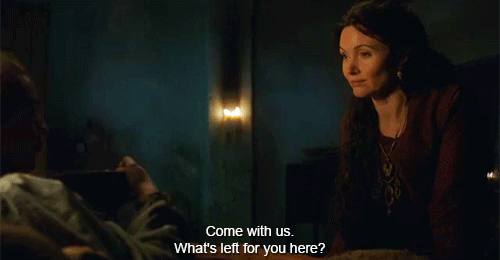
But two problems, of course: 1.) Lady Crane was purposely propped up to be a sympathetic and likable character for yet another “oh no they didn’t this show is sooo evil” shock death, and 2.) they felt they needed to explain her ability to stitch someone up, and the best option to do so was by giving her a history of mutilating her lovers that cheated on her. What. I guess that’s how we know she’s “badass.” And sure she can sew, but she can’t cook; she’s not too girly, amirite?
Arya, though, is actually the most interesting example this year. Stick-hitting complaints aside, you could really have read her arc as her utter refusal to turn towards violence anymore. If so, the implication would be that she had learned her lesson with the Trant situation last year, and perhaps the catharsis she may have felt in the moment had taken a toll on her.
For instance, in her training montage she tells The Waif about “Arya Stark’s” revenge list, and The Waif seems to beg for an invite onto it:

Which Arya doesn’t do. She seems to be determined not to get dragged down by the Waif’s pettiness. Secondly, we see her question the entire concept behind being an assassin, and deciding that this isn’t the career for her; killing someone as nice as Lady Crane (lover stabbings aside) didn’t sit right with Arya’s moral code; she did what she had to do in order to escape that assignment, and at least try to protect Lady Crane. Unfortunately, that meant seeing Lady Crane’s grisly demise, and being forced to kill The Waif (in what can only be seen as self-defense), but perhaps this could have been another part of her sharp lesson. Afterall, she joined the Faceless Men to kill everyone she wanted, and now she’s learning why that’s not a desirable thing.
The logical endpoint for her arc this year was when she quit the guild. Except that it didn’t stop there. Her storyline concluded with her warping to the riverlands, carving up two Freys off-screen, and feeding them to their father before murdering him in the name of revenge. This is one of the most extreme instances of violence on the show, and we were expected to enjoy it because it was a “good guy” committing it. And we were also probably meant to think of her as a Badass.
In past seasons, women could gain empowerment not just through violence, but also sexual manipulation…another sexist trope, for sure, but compared to this year it might have actually been refreshing. That’s the kind of show we’re dealing with. As such, Margaery Tyrell, the Sexual Liberation Pioneer was most certainly presented to us as a Woman on Top. Though I found her Season 5 scripting incredibly concerning, it might shock you to learn then that this year, I had very little issue with what they were going for with her, at least from a feminist perspective. She was going to do whatever it took to get her brother to safety, even if it was against her self-interest, her House’s interest, and actually the interest of the entire kingdom with this whole “new alliance between Faith and Crown” that looked none too promising.
There was a problem with its execution given that the deal she settled for was actually so destructive and horrible that she ended up looking entirely daft, but ignoring the details and looking just at the message, it was a story of sisterly love — the story of a woman who had no recourse (because perjury is a very serious crime) and did what she could to navigate her situation and squeak out as much agency as possible. She did it without violence. In fact, she put an end to the violence that probably would have made the most sense for her, her brother, and the kingdom. But Margaery broke the trope I’m complaining about, so that’s a good thing, right?
Well, what happened? The narrative punished her for it, fiercely. In fact the only silver lining of her storyline from this season is that she managed to convince Olenna to leave the city, putting her now in the position to seek violent revenge and get that power back for House Tyrell. Or just not the Lannisters. Which I’m pretty sure we’re supposed to want, as viewers.

It’s like the narrative bends over backwards to punish those who don’t choose a violent path and embrace toxically masculine ideals. Consider the examples I just gave: D&D shoved every person in one plotline into a room and exploded them, Arya outright warped to the riverlands and accomplished everything she needed to do to set up her full revenge on Walder Frey off-screen (she had to have taken over the kitchens to make those pies…), Lady Crane left a trail of mutilated exes and apparently harmed a colleague and no one seemed concerned, and Yara literally argued the opposite points to Dany that she had made to her father earlier in the season. This isn’t even going into the fact that The Waif had no motivation whatsoever for hating Arya as much as she did to the point where she delighted in the moments that she was able to inflict pain on her.
It’s not just that GoT endorses this violent badassery—it’s that it defies all logic to do so. That’s how desperate D&D are to push forth this world view. Though one needs look no further than Sansa’s storyline for the past two seasons to truly understand that.
As a crash course, last season at Littlefinger’s urging, Sansa agreed to marry Ramsay Bolton to get revenge on his family for murdering hers. But somehow this master plan went awry, especially because Ramsay was kind of a badass a cruel and sadistic person who ended up raping her on their wedding night, as well as subsequent nights afterwards and kept her locked up. Theon helped her to escape Winterfell, where she then proceeded to go North and find her brother, Jon. She convinced him to raise an army of Northern Lords to fight Ramsay and retake Winterfell from the Boltons for their family, while rejecting help from Littlefinger and his offer of the Vale troops. However, the Northern Lords weren’t really signing onto this effort, so Sansa decided to eat her words and accept Littlefinger’s help. Jon’s army won the battle (pretty much entirely as a result of this), and Jon himself left Ramsay alive for Sansa. She decided to lock him up in a basement and feed him to his own dogs. Then she sat quietly while Jon was elected King in the North and raised not a single objection, yet still closed the year with a slightly miffed expression on her face.
Now, “Sansa vs. Jon” was a tension definitely set-up this year, and promising to continue into Season 7. So I don’t want to act as if Sansa’s plotline was entirely one-note. However, there is no denying that the thematic climax of her arc was when she killed Ramsay, and killed him in a brutal fashion. Her story for the past two seasons was all about reaching that moment.

I don’t want to pretend that there aren’t survivors who wouldn’t do exactly what Sansa did in that position. That it wouldn’t be satisfying or even cathartic on some level to do horrible things to one’s abuser. For that reason, it’s not like feeling validated by Sansa’s actions is this awful thing, and I’m never one to say “she’s just as bad as Ramsay now!”; that’s simply a false equivalency which ignores the fact that many survivors lash back because it’s how they feel compelled/equipped to defend themselves. There is no one way any survivor looks, and though I’m about to be quite condemning of the narrative, it’s due to the messaging and presentation, not a desire to only accept certain responses to abuse.
However, there is a reason #BreakTheCycle exists. Because perpetuating violence in any form, even as means to achieving “noble” revenge, is damaging to one’s self. We can bring neuroscience and biology into this if we want, but I think it’d be missing the forest for the trees. The issue with Sansa’s story isn’t a simplistic “violence is bad” deal; it’s that this was her path to empowerment.
Which yeah, patriarchal values, the confusion of what feminism even is…everything I’ve been saying up until this point. But what mystifies me is that D&D felt that this path was even needed in the first place. Like, did they watch their own show? At the end of Season 4, Sansa claimed her agency for herself, and it was almost solely through the use of her intuition. However rushed that moment may have seemed given the trajectory of her arc leading up to it, and however ridiculous her Outfit of Empowerment was, there’s no denying that the moment she lied to and played the Vale Lords…she was getting what she wanted. She understood her hold over Littlefinger, she understood the value of her name, and she earned herself powerful allies in case anyone would think to take advantage of her.
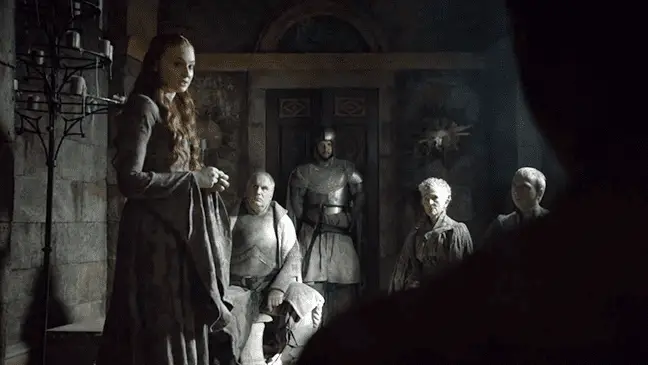
In short, she was an empowered “player.” So why in seven hells did D&D dial back her character growth and have her blindly trust in Littlefinger again the next season? What did her going to Winterfell actually serve, especially in terms of her character? No…frankly, for anyone’s character? Because I’ve been running with the assumption that it was for the benefit of building up Ramsay’s villain-status, but in what universe would his treatment of Osha and Rickon this year not have accomplished that anyway?
The messaging of this creative decision is horrific: that Sansa thought she was a player in control of the situation, but when she faced her first real trial she learned she wasn’t ready and was horribly punished for it. Then, thanks to her brutalization she learned who she was truly dealing with and could face the grim reality of that world with a hardened attitude. Rape was her teacher; she became a player because of her rape, not despite it.
There’s no part of me that thinks anyone would willingly write a story to make that point, it’s just too awful. It’s actually more generous to assume that D&D didn’t even consider the messaging or Sansa’s past characterization, and instead focused solely on the fact that they knew she’d eventually triumph in this situation. In fact, her inevitable vicotry was something Bryan Cogman almost outright promised in the Season 5 DVD commentary:
“It’s an upsetting scene, it’s a horrifying scene, it’s meant to be … [But] the accusation that our motives were [that we] just threw in a rape for shock value, I personally don’t think the scene as shot, or as written, or as acted by our wonderful actors, supports that argument. Nor do I think the aftermath of the scene supports that argument. Not only in these episodes, but also in future episodes. This story is not over. This is a long ongoing story. Sansa has a journey ahead of her, and what happens to her in that room is a huge part of that journey, and one that we’ve thought through.”
This was aided by Sophie Turner’s remarks on Sansa’s character, since for some reason she was expected to defend the storyline during the 2015 SDCC panel.
“[If] there’s one thing that Sansa still is, despite what happened to her, [it’s] strong.”
Don’t worry, just stay tuned! They’d never make a story about a rape survivor who wasn’t strong! There’s going to be a TV-ready conclusion! And again, it’s not to say there aren’t survivors who would reach the same conclusion or project strength in the same way, but it’s the fact that it was the One Promised Path that makes it an issue. The immediate dialogue basically trampled over any survivor who doesn’t feel so strong. And that was never even given a chance to be viewed as a valid reaction for Sansa, because that’s not enjoyable to the TV-audience. Even if it’s kind of exactly the story George R.R. Martin told in the supposed source material with Jeyne Poole and Ramsay, who deals with her abuse by trying to avoid more harm, rather than acting in a “hardened” manner and fighting back. But the assumption was made long ago that the viewers couldn’t care about Jeyne.
In fact, another remark of Cogman’s from the DVD commentary really emphasizes their notion of marketable storytelling:
“Basically, when we decided to combine Sansa’s storyline with another character in the books it was done with the idea that it would be hugely dramatically satisfying to have Sansa back in her occupied childhood home and navigate this Gothic horror story she’s found herself in and, of course, to be reunited with Theon – setting her on the path to reclaiming her family home and becoming a major player in the big overall story.”
I’m sure you’ve seen me make ironic use of “dramatically satisfying” before, but need I remind you that Sansa’s rape was basically the only plot-point in Winterfell last year. Sansa’s rape made Myranda jealous. Sansa’s rape made Theon want to help her. Oh, and Stannis was coming and Ramsay wanted to prove himself a worthy heir to his father by handling this threat, but that had literally nothing to do with Sansa. So the above quote is Bryan Cogman straight up admitting that they found the idea of Sansa being raped and then getting violent revenge for that rape to be quality entertainment. We, as the audience, were expected to just consume this because Rape is Drama. But it’s only good drama when it also spurs the woman to become a major player and get her revenge.

Exploitative, sensationalist hogwash.
And not to beat a dead horse here, but D&D had every reason in the world, and in their own damned story, not to rape Sansa. There’s the fact that she already had the motivation to want to reclaim her home (or even if they felt the Red Wedding wasn’t enough, Rickon was about to turn up). There’s the fact that no matter how you spin it, marrying an enemy is not actually a path to revenge and no person with a working mind would agree to such an arrangement, especially knowing that said enemy was about to be attacked by a large host. Heck, there’s the fact that Sansa staying in the Vale this whole time actually would have made more sense with how her 11th hour save at the Battle of the Bastards played out, since sticking her in the North required her to withhold crucial tactical information from Jon.
Tell me one thing about where Sansa is now that couldn’t have been accomplished without her rape.
So we’re back to the fact that D&D felt *this story* was crucial to tell—this story with this particular endpoint where Sansa got a spectacularly gruesome, violent revenge on Ramsay. She could have sentenced him to death and had Jon behead him. She could have brought up any of his other victims to at the least give us a small sense of justice in the framing (I guess she mentioned his dogs, to be fair, but funny how Rickon, Theon, Lord Cerwyn, the “North Remembers” Lady, or the thousands of slaughtered Northmen didn’t come up). But no. This was the dramatically satisfying story that needed to be on our screens, and rape was the plot device that needed to spur Sansa to become a smarter, stronger woman.
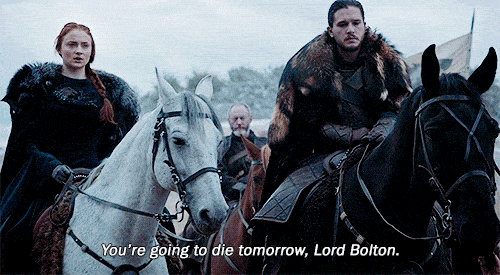
Which…okay, it’s the story they wanted to tell, and like I said, there are survivors who respond violently to their abusers. But this is also the story they’re telling with every character in the show, which makes its inclusion just completely superfluous. Or sorry, Cogman, but “gratuitous.” We get it: violence and revenge is the path to empowerment. Women who are violent can be On Top, just like men! I guess it’s possible that there’s going to be an exploration in the toll this takes, but given that we’re six seasons in and so many moments of violent revenge were framed as a very strong positive… Let’s just say I’m not holding my breath.
Actually, case and point of this might be the fact that the few instances where someone committing an act of violence was framed as a negative were virtually indistinguishable from the moments we were meant to cheer with, a point Gretchen hammered on beautifully in her revisiting of “acedia” in current media.
As an example, I know that when Cersei “chose violence” in the hallway scene with the Faith Militant, we weren’t supposed to side with her. But why not, exactly? A bunch of destructive fanatics who oversaw her sexual humiliation wanted to drag her out of her home and present her to the man who ordered it in the first place without giving a single reason. Why isn’t it noble for Cersei to want revenge (or in that case just defend herself, really), but it’s okay for Sansa to feed Ramsay to dogs?

Even blowing up the sept or having Septa Unella tortured…yes, these were completely over-the-top acts of violence, but is it so very different than Arya killing two men, grinding them into pies, feeding them to Walder Frey, and then slitting his throat? With the sept, it’s almost more justifiable given that Cersei was backed into a corner and had no other recourse; it was clear the trial process was complete corrupt if Loras’s trial, or the inquisition hearing of last season, was anything to go by. So what was she supposed to do, exactly?
But no, any time Cersei wanted revenge, or tried to claim her own agency, we weren’t meant to side with her. The best example of this disconnect might be in a scene with Olenna. Cersei suggested combining forces and taking out the Faith (even though they just had done exactly that the episode prior and it failed), and Olenna refused, calling Cersei “truly vile” and one of the worst people she had ever met. Even ignoring that Olenna literally murdered her son so there’s a pot and a kettle situation here, why is it then that when Olenna decides to team up with Ellaria and Varys for revenge, we’re meant to agree with her, but when Cersei suggests basically the same exact thing, only for a threat that is quite a bit more present and actively harmful towards Olenna’s family, it’s unsympathetic? Because the only thing I can think is that Cersei is a designated “bad guy” and Olenna is a designated “good guy.” Which means that there’s actually nothing separating protagonists and antagonists but marketing. Or sometimes costumes.
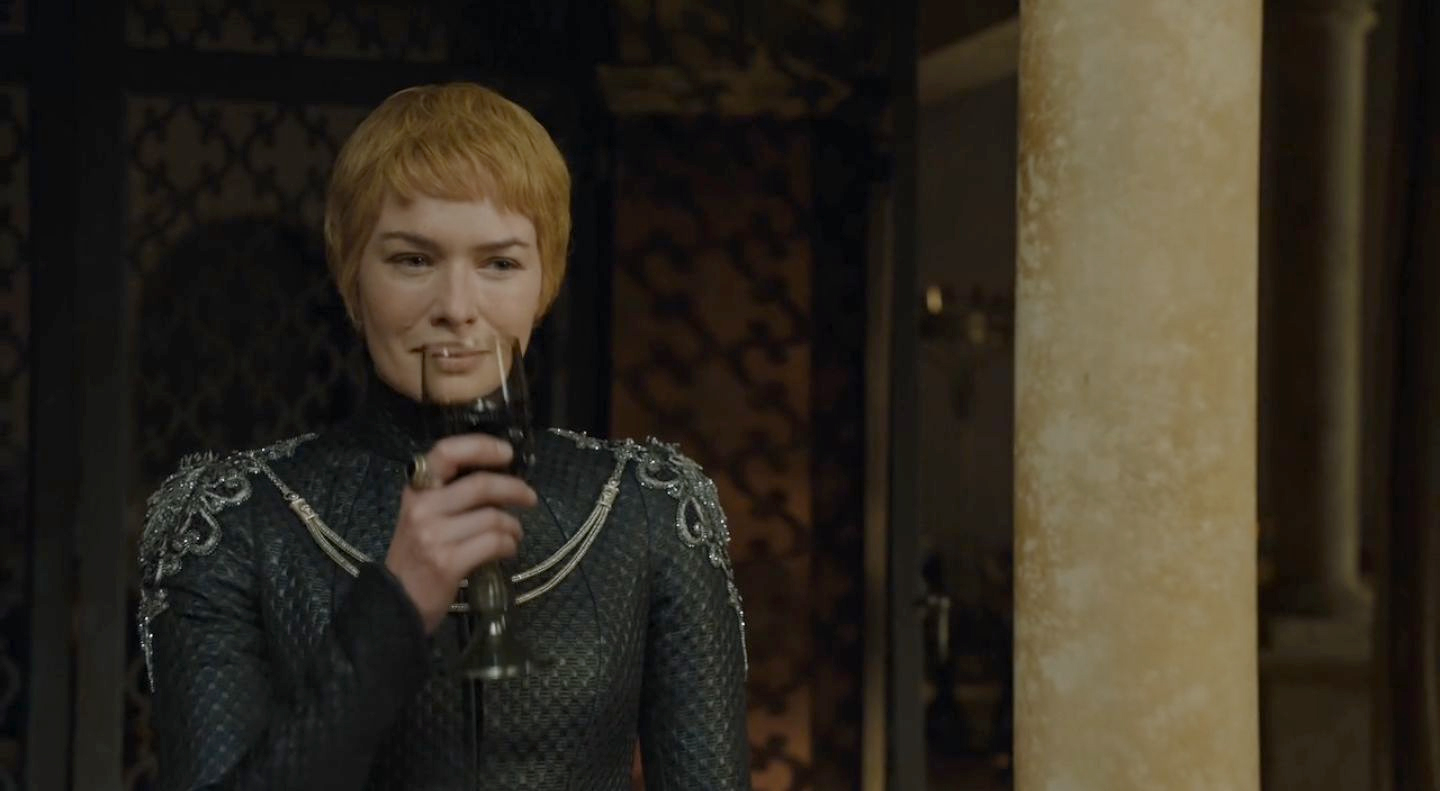
This is because everyone needs to be motivated by violent revenge, or else they’re going to go the way of the hapless victims who weren’t Tough enough to survive, like Loras, Margaery, or Septon Ray.
Daenerys burning down a culture’s social structure and gaining followers = good. Cersei burning down a culture’s social structure and gaining followers = bad. I guess we can talk about the dark grey vs. grey nature of these social structures, but it’s not as though the Faith Militant’s homophobic crusade allowed for much more lightness in the palette. Though what’s truly mystifying to me is that good or bad, both of these actions apparently supported a very feminist message because the women ended up triumphing as a result. Like, the narrative has to completely contort itself so that they do, as I pointed out in Part 1.
To be perfectly honest, the only reason I didn’t fully mention Ellaria and the Sand Snakes murdering their own family is because I still have no idea if we’re meant to take it as a positive or negative. When the first episode aired, I immediately argued that these women are evil and not supposed to be gaining audience sympathy, but now I realize that perhaps I had been too generous, and that Ellaria’s “weak men will never rule Dorne again” remark was supposed to be taken at face value? That we were supposed to agree about how useless Doran and Trystane were for trying to bring about peace, and applaud these women for their initiative. Because as villainous as this seemed, they’re now teaming up with Daenerys and Olenna, who are unquestionably protagonists, though damn if I know why. It’s team #WomenOnTop defeating the patriarchy through violence! Even though said violence is upholding the very patriarchal values they supposedly object to.

Actions don’t matter, just who’s doing them. And that’s because actions on Game of Thrones are a foregone conclusion. It’s impossible for there to be a remotely feminist message when all characters are locked into a violent and revenge-worshipping mold. Because if actions don’t matter between protagonists and antagonists, they sure as hell don’t matter between men and women. It’s not women on top of this show; it’s David Benioff and Dan Weiss’s mold for the ideal hero — a mold of toxic masculinity that is utterly sexist no matter what gender is cast into it.
The rest of the series can be found here:


